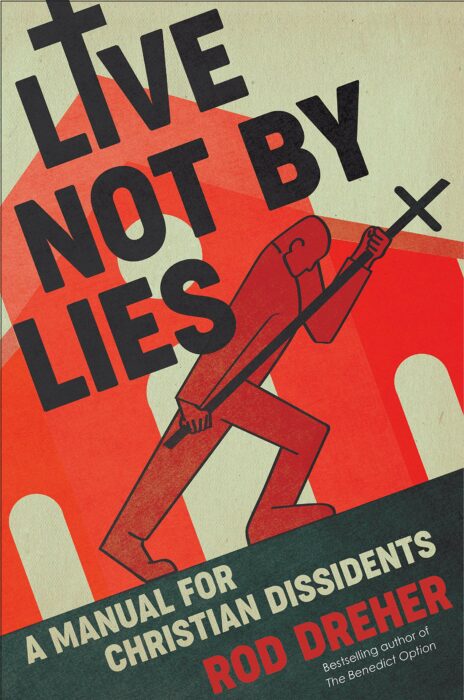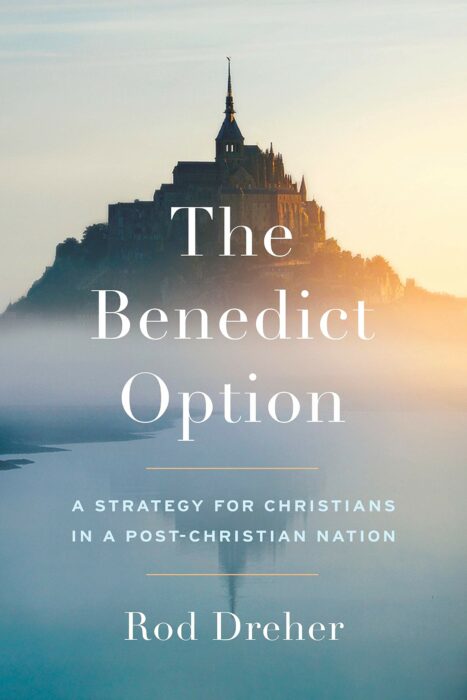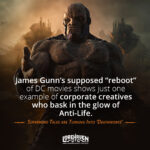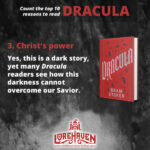Militant Secularism Could Force Christians to Create New Subcultures
We often use the term “Christian ghetto” in a way intended to sound derogative.
This phrase refers to an artistic subculture riddled with kitsch, propaganda, and second-rate content. Labels like “Christian fiction,” “Christian music,” and “Christian films” describe the lowlands of this ideological backwater.
However, the “Christian ghetto” term fails to reflect Christian consumers’ well-meaning approach to seek content that reflects their values and beliefs.
Yes, the Christian subculture may not always be technically on par with mainstream pop culture. But its makers share a legitimate, if not noble pursuit to provide its audience with alternative fare.
Nevertheless, we may have valid theological concerns at the root of our criticisms against such Christian subcultures. Jesus calls believers to be the salt of earth, to shine a light in the darkness. So how can we influence the world by withdrawing from it? In fact, the moral rot in many creative institutions could be due, in part, to Christians giving up on them.
 This is why I’ve long applauded Christian artists engaging mainstream culture. It’s why I write my Reagan Moon paranormal thriller novels for the general market and no longer publish content labeled “Christian fiction.” It’s also why I’ve taught workshops for Christian authors about writing for the general market. It’s why I’ve blogged about “The Christian Crossover Novelist,” and it’s why I’ve asked, “Is Writing in the General Market LESS of a Ministry Than Writing for Christians?”
This is why I’ve long applauded Christian artists engaging mainstream culture. It’s why I write my Reagan Moon paranormal thriller novels for the general market and no longer publish content labeled “Christian fiction.” It’s also why I’ve taught workshops for Christian authors about writing for the general market. It’s why I’ve blogged about “The Christian Crossover Novelist,” and it’s why I’ve asked, “Is Writing in the General Market LESS of a Ministry Than Writing for Christians?”
But as much as I’m an advocate for Christian influencers in secular circles, I’ve lately found myself wondering if it isn’t in fact time for a new Christian subculture. Or, to put it another way, a tactical withdrawal.
So what caused me to change my mind? Let me explain.
In the past, Communists took over popular culture for evil ends.
In his latest book, Live Not by Lies, Rod Dreher interviews survivors of Communist regimes. They share a unique perspective about the fate of America, seeing in her a similar drift towards “soft totalitarianism,” the precursor to a full-blown totalitarian state. Dreher writes, “The parallels between a declining United States and pre-revolutionary Russia are not exact, but they are unnervingly close.”1
 Of course, such national transformations took decades. Interestingly enough, artists, playwrights, and novelists often played a strategic role in shifting their political culture. Dreher quotes Patrik Benda, a Prague political consultant, speaking of his native Czechoslovakia’s ideological descent:
Of course, such national transformations took decades. Interestingly enough, artists, playwrights, and novelists often played a strategic role in shifting their political culture. Dreher quotes Patrik Benda, a Prague political consultant, speaking of his native Czechoslovakia’s ideological descent:
In the 1930s, before the rise of the communist regime, there were already strong forces in the culture that paved the way for it. All the artists and intellectuals advocated communist ideas and if you didn’t agree, you were marked for exclusion. This was almost two decades before communism took power.
Communist Party leaders enlisted creatives’ engagement for the virtual purpose of propaganda serving their Communist regime. For example, Soviet leader Joseph Stalin once described writers as “the engineers of the human soul.” For Stalin, shaping souls was more strategic than building tanks. This is why we often saw Communist countries banning books and executing traitorous writers.
Today, Christianity’s enemies are also overtaking popular culture.
For now, Western Christianity faces no such comparable persecution. Nevertheless, 21st-century classically liberal democracy has seen the rise of a new intolerance.
As Patrik Benda put it, in pre-communist Czechoslovakia, if you didn’t agree with the artists and intellectuals who advocated communist ideas, “you were marked for exclusion.” This “exclusion” proved a precursor to naked totalitarianism and finds a contemporary analogue in 21st-century “cancel culture.” Wikipedia defines:
Cancel culture (or call-out culture) is a modern form of ostracism in which someone is thrust out of social or professional circles – either online on social media, in the real world, or both. Those who are subject to this ostracism are said to be “canceled.”2
Cancel culture is an outgrowth of a militant progressive orthodoxy that is spreading in the West. Some have described this cancel culture as “the Great Awokening,” a play on the Great Awakening, the 18th-century religious revival in the United States. The term is apt because this new movement has an unusually religious feel. Its religious adherents elevate social-justice causes to the level of dogma, sacralize the marginalized and/or victim groups, and inspire their own Inquisition of apostates and heretics.
As this movement has gained power, it’s also consolidated powers, and at the highest levels. CEOs, studio heads, department chairs, and editorial staffs—all once apolitical institutions, theoretically—have all joined “the Cause” and began purging undesirables from their ranks, thus codifying this new orthodoxy.
Example 1: the Hugo Awards in 2014
For instance, at one time the Hugo Awards served as sci-fi and fantasy fiction’s premiere award. But in 2014, the prestigious group became embroiled in controversy after one of its nominees, Larry Correia, was outed as an “outspoken rightwinger” (those are his words). Correia charged the Hugo voters with being biased toward political leftists and social justice causes, and for sabotaging politically conservative writers. A mob ensued. He received public and private threats (an act now called “doxxing”). The controversy led to a split in the fandom that Wired magazine described as “a battle for pop culture’s soul.”
With that “battle” eventually behind them—and with the disreputable “weeds” sorted from among the approved “wheat”—the Hugo Awards have since become a highly agenda-driven entity, committed to highlighting diversity, social justice causes, and presumably, no more “outspoken rightwingers.”
In years since then, this “battle” has become more expansive and ideologically exclusive, undeterred by even the biggest celebrities.
Example 2: J. K. Rowling in 2020
In summer 2020, fans broadly denounced J. K. Rowling, the world’s best-selling author, after she said that men can’t menstruate. Rowling tweeted her support for Maya Forstater, a British researcher who lost her job at a nonprofit think tank following a series of her tweets that critics called “transphobic.” As a result, large sectors of the internet went unhinged, even holding Harry Potter book burnings. Many bookstores chose to stop selling or platforming Rowling’s books altogether.
Example 3: Leticia Wright, Gina Carano, and beyond
Authors, artists, and celebrities are now routinely de-platformed for failing to pass politically correct litmus tests regarding race, politics, or LGBTQ issues. For example, Black Panther star Leticia Wright was forced to cancel her Twitter account after posting an anti-vax video from a church leader who, according to Variety, “questions the legitimacy of the COVID-19 vaccination, appears skeptical of climate change, accuses China of spreading COVID-19, and makes transphobic comments.” More recently, some fans demanded for Gina Carano’s removal from The Mandalorian because she “appears to lean right, politically speaking.”
This purge has also hit hard against academia. The National Association of Scholars has taken to “Tracking ‘Cancel Culture’ in Higher Education,” recording at least 117 censures, terminations, or forced resignations of professors due to woke ideologues. They summarize the “cardinal sins” sought for expulsion by the modern left as “racism, sexism/misogyny, ableism, sizeism, nationalism, climate change denialism, homophobia, transphobia, xenophobia, fatphobia and islamophobia.”
Finally, political culture and policies especially enable this shift against Christian influence and traditional morality. The day before his Jan. 20 inauguration, new U.S. President Joe Biden nominated Dr. Rachel Levine as assistant health secretary. Pundits hailed Levine as the first transgendered person to occupy that position.
Biden followed with Jan. 21 rollbacks of abortion restrictions and discriminatory policies, signing an executive order that will allow boys who identify as girls to compete in girls’ sports. He has also promised to pass the Equality Act. As Albert Mohler put it, “The Equality Act would be a sweeping moral revolution that would set up a direct conflict with religious liberty, and one that the Equality Act would set up for religious citizens and religious organizations to lose.”
If politics is downstream of culture, then we must admit that something very bad is happening upstream.
Many Christian nonfiction and fiction writers are not resisting but enabling these false faiths
In times past, I would have seen such a trend as a normal progression of secular decline. After all, the Bible repeatedly warns Christians of dark days ahead. Deception, immorality, and persecution will increase, so the Church must be prepared. Unfortunately, these days it appears the Church isn’t ready for this.
In “The Return of Liberal Christianity,” apologist Gene Veith writes:
… The most woke places in America, apart from university campuses, are mainline Protestant or liberal Catholic churches. The Evangelical Lutheran Church in America, the Presbyterian Church (USA), the Episcopal Church (USA), the United Church of Christ, the Christian/Disciples of Christ (the one I grew up in), among others, are all strong, official advocates of same-sex marriage, homosexuality, feminism, transgenderism, and abortion. They support critical race theory, post-Marxism, and intersectionality, and traditional morality–while still to be found–has been supplanted by political rectitude and leftwing activism.
As a result, Christian publishing now reflects many of these dangerous ideological trends. Children’s books like Queerfully and Wonderfully Made: A Guide for LGBTQ+ Christian Teens are now available from religious publishers. Trust Women: A Progressive Christian Argument for Reproductive Justice frames the case for a “Christian pro-choice” stance on abortion. IVP, a once-respected Christian publisher, now specializes in “Racial Justice” titles; one can find books like The Coming Race Wars, Is Christianity the White Man’s Religion?, and Can ‘White People’ be Saved?
Popular female authors, like Rachel Hollis, openly embrace self-help, pop theology, while others like Jen Hatmaker now laud LGBTQ-affirmation and champion social justice causes. New York Times bestselling author and former Christian “mommy blogger” Glennon Doyle made news when she announced she was leaving her husband of fourteen years for another woman. As of this writing, her most recent book ranks number one in Amazon’s “Christian Self-Help” category.
Likewise, Christian novelists are increasingly identifying themselves as ideologically “woke” and including more themes of social justice, diversity, LGBTQ affirmation, and antiracism in their stories. (By contrast, I recently spoke to one author who was forced to publish independently because their agent admitted that the industry is looking to publish fewer white authors.)
From my perspective, this all shows evidence of a slow but ominous cultural shift.
Such trends can be disheartening to those of conservative values and traditional religious orthodoxy. The current Christian subculture, despite its kitsch and puritanical legalism, at least hoped to provide a bulwark against “the world, the flesh, and the devil,” and a respite from their incursion into the believer’s life. However, it is becoming apparent that the Church in America has been largely ineffective in battling the forces of cultural decline.
In fact, the Church in America is actually part of this cultural decline!
Faithful Christians need options beyond mainstream popular culture, including new Christian subcultures.
Not long ago, I received a letter from another Christian writer. She asked, “How can I navigate controversial subjects without jeopardizing my platform?” As a Christian conservative, she feels compelled to speak on certain issues. But the reality is that doing so in today’s climate could shipwreck her career.
This really leaves the conservative Christian writer with only two options: (1) Shut up; or (2) prepare for blowback.
No doubt some will point to these concerns as evidence of a persecution complex. “Mike, you’re exaggerating. Things aren’t that bad!” Others will hail these developments as signs of cultural progress.
 In his previous book The Benedict Option, Rod Dreher suggests that the “steady decline of Christianity and the steady increase in hostility to traditional values” could prompt consideration of a “strategic withdrawal.” He calls this the “Benedict Option,” alluding to Saint Benedict, a sixth-century church father who responded to the collapse of Rome by founding a monastic order. Dreher writes:
In his previous book The Benedict Option, Rod Dreher suggests that the “steady decline of Christianity and the steady increase in hostility to traditional values” could prompt consideration of a “strategic withdrawal.” He calls this the “Benedict Option,” alluding to Saint Benedict, a sixth-century church father who responded to the collapse of Rome by founding a monastic order. Dreher writes:
The idea is that serious Christian conservatives [can] no longer live business-as-usual lives in America, that we have to develop creative, communal solutions to help us hold on to our faith and our values in a world growing ever more hostile to them. We … have to choose to make a decisive leap into a truly countercultural way of living Christianity, or we [will] doom our children and our children’s children to assimilation.
Yes, a “strategic withdrawal” could sound like a cop-out. But this could also be the impetus for more diverse, creative responses to cancel culture and our nation’s moral rot. But what would this version of the “Benedict Option” look like? And how would it be any different from the current Christian subculture? Besides, why not just stay the course, remain faithful to Jesus, and let the world (and some segments of the Church) fall into Darkness?
I suggest that “business as usual” is a bad response. Instead, I offer three proposals that could help move a discussion forward:
First, we must admit the situation is grave.
Some Christians will be divided on this, but I believe we must admit that the aforementioned trends are, in fact, bad. Just as in medicine, the proper treatment demands the proper diagnosis. The sad truth is that the Church is split on many important cultural issues. Is that “split” enough to prevent us moving forward together? Can we agree on a diagnosis? What biblical support causes us to reach those conclusions? On what points do we disagree and why?
Either way, simply staying the course is to invite persecution or, worse, assimilation. In that case, the next generation would be the one that pays for our inaction.
Second, we must admit that the current Christian subculture has been mostly ineffective at empowering Christian consumers and persuading outsiders.
Even if Christian arts have bolstered the faith of their consumers, that “faith” has made little impact on our surrounding culture. It has enforced values that have not found root “upstream.” Conversely, it’s possible that the subculture itself has conditioned us to disengage from secular culture and simply find respite in “preaching to the choir.” Inspirational fare has acted more like a placebo than a training manual for warfare.
So we must ask: In what ways has the current Christian subculture helped strengthen the Church? In what ways has it possibly contributed to cultural decline?
 Third, we must re-imagine a more robust approach to art and culture.
Third, we must re-imagine a more robust approach to art and culture.
If we double down on our existing subculture models, this may do little more than serve as a white flag of surrender. Reinforcing our castle walls won’t help if the adversary has trademarked weapons technology.
By contrast, the folks at conservative organization The Daily Wire have recently begun a project that may serve as a model for conservative Christians. On Jan. 14 they released their first film Run, Hide, Fight, an R-rated action thriller designed to compete in the general market. So rather than trying to make inroads into existing popular culture, they are attempting to simply make their own culture.
Thus far, Christian culture—specifically film, fiction, and music—have not offered competitive alternatives to secular fare. What tactical changes would be required of Christian creatives to do so? What kinds of a Christian subculture could actually compete in the broader marketplace?
For the record, I still support Christian creatives engaging in mainstream popular culture. I’m simply grappling with the possibility that we are unlikely to influence existing creative institutions. These are too far gone. Christian conservatives will now likely be forced to make their own culture, or else, to be assimilated. At this stage, do we really have any other choice than a “strategic withdrawal”?
- Rod Dreher, Live Not By Lies, boldface emphasis mine. ↩
- Wikipedia entry for “cancel culture,” as of Jan. 22, 2020. ↩










































Very good article. And thank you for the reference to the Daily Wire movie. Had not heard of it. I agree that this is what we should be doing — engaging the culture on our own terms. I am constantly inspired and chastened by the examples of Christians in countries where they truly experience persecution. They just become bolder, if more cautious. They don’t cave in. They don’t give up. And they pray for their persecutors.
It occurs to me that media being produced in certain other countries, such as in South Korea or in Latin America, is as now not onboard with the entire agenda so popular in Europe and North America.
Perhaps, the future will see Christians from the USA, Canada, Europe, and perhaps other “First World” countries as well fleeing to nations in East Asia or to places part of the so-called “Third World.”
This option has some similarity with what this article says, but in practice could be quite different from merely hunkering down in enclaves in nations like the USA.
Regarding “ ideological descent”, I am reminded of my 7th grade Social Studies teacher. One comment was before a group of people is really accepted in American society, it is the target of jokes for a number of years. This was back in the 1970’s.
A thought provoking article, illustrating that a”long game” is being played in this worlds culture/subculture. In the past couple years, I have seen numerous creative people challenging fellow creatives to use their skills and influence for social change, through storytelling via video. (My interests have been in videos & audio dramas). After reading this article, the next email I read was from “Seed & Spark”. But the point is a team is raising funds to produce an audio drama called Dawn of Hope”. Their Mission Statement is:
The Dawn of Hope is a podcast created by audio-inspired writers, producers, and sound designers. Our story demonstrates an ability to fight for one’s basic human rights despite an overpowering government. Set in 2243 it is too late to change however there is hope if we begin the revolution in 2021.
I am not advertising for them, but it feels like their mission statement and others parts of their website are good examples of people “playing the long game” to change others.
Your third point may have another example, (disclosure:which I support) SUPERSONIC Pod Comics.
An audio drama from people with experience in comic books.
Not that you have any particular reason to care Mike, but you are somebody I wrote off a long time ago. I saw you as far too thoroughly pickled in the world and the things therein to take seriously.
This article gives me the great hope that maybe I was wrong. A thing I would joyously celebrate.
You are still fighting a war that scripture never commands us to fight, with weapons we are never commanded to wield, in the name of a victory we are never promised we’ll see in this age.
However, this piece evinces a foundation in you (I hope) that I didn’t think was there.
“Either way, simply staying the course is to invite persecution or, worse, assimilation.”
Indeed. Assimilation would be far worse. Never have the true worshipers of the one true and living God been more powerful as a testimony to and instrument of new life in Christ than when she has been most fiercely persecuted.
That’s all I’ll say for now. If you continue veering in the direction this article appears to demonstrate, there will be biblical realities down that road you are not going to like.
I agree with everything except the use of the word “ineffective.”
In the Christian subculture we have an omnipotent God bringing about his own purposes in this world. He is not blind. He is not impotent. His word is JUST as powerful as it has ever been. Rather, I think this is the great sifting that is spoken about in Scripture. The pitchforks are sorting wheat from chaff. God is not silent nor does he sleep. Here is a verse about this: “Pass through the city, through Jerusalem, and put a mark on the foreheads of the men who sigh and groan over all the abominations that are committed in it.” Ezekiel 9:4
We find in Exodus, that Joshua and Caleb had grown up in Egypt, and yet had a vibrant, trusting, hopeful faith though we read a few chapters earlier that it seemed God was silent to their plight. There is nothing ineffective about sheep and goats proving what they love the most. There is nothing ineffective about the Church being the Church. BUT…there are ineffective “churches” and these are the ones who do not hold HIGH their fear of God, their hatred of sin, their love of their enemy and neighbor.
We do need a place to all band together, which is supposed to be physically, regularly, for the purpose of worship. Churches are upping their internet presence because of the virus. And I believe many Christian visionaries are even now working on alternative Open Source, conservative networking sites as a reaction to this expulsion from Egypt.
But even as the Church is kicked out into a desert, we want to be the ones who don’t long for the leeks of Egypt. We want to use the models in Scripture to learn how to BE light in the darkness. As you, @MikeDuran, have a vision for being cross-over, to persuade the secular market as a god-fearing author, others likewise must not be caught “IDLE” when He returns. We creatives will continue to dig our new river, though it looks dammed up.
We are not ineffective. We are doing what we are supposed to be doing, and people are coming to faith. In light of this, a good book to get historical context would be by D. James Kennedy.
Thank you for this very helpful article.
The title did not show: What If Jesus Had Never been Born by D. James Kennedy.
Darlene, I appreciate your comments, especially the biblical references. Thanks!
Mike, a little pleasure reading for you–The Captive Mind, by Czeslaw Milosz. It will give you some more perspective on the communist ideological purges in art that you cite here. Also, the conflation of Christian witness and Christian consumption is precisely the sort of thing I think you want to critique. Finally, I don’t see how today’s “cancel culture” is better or worse than ideological regimes that have held sway in various times/places. “Militant secularism” is a label with a long history, and I’m afraid using it contributes to the narcissism of contemporary evangelicals who elevate themselves above the saints and martyrs of the past. The fight of discipleship in art and witness remains the same, and greater is he who is in us than he who is in the world. Thanks for sharing your thoughts and your long career of exploring the relationship between Christ and Culture, a la Niebuhr.
One thing I’m personally looking into as a result of all these trends is a Christian classical education. I’ve barely scratched the surface of this concept, but as a speculative writer, it looks very much like the type of learning I’ve yearned for my whole life. I think that this could very well be a pathway to genuine cultural renewal and rebuilding. Here’s a good website for whoever’s interested: https://www.circeinstitute.org/resources/what-classical-education
Have you watched The Chosen? Largest crowd-funding project in history, beautifully acted and filmed, with high production values. It’s biblically sound, and yet is tapping into the current zeitgeist with tremendous impact. The number of viewers worldwide is staggering, and growing. All without one cent from one secular production company, and it’s free to watch through their app and YouTube. It’s not an exaggeration to say that The Chosen is changing lives. You just have to read the comments on their Facebook page to see that. I would also point to the popularity of music like Hillsong United, Elevation, and For King and Country. They are incredibly popular and I think do have crossover appeal. So, although I agree with your main points (I read The Benedict Option), I think there are a few, faint hopeful signs of pushback.
In fact, The Chosen is one of the greatest signs of the untold potential of Christian-made subcultures. It did not need Christian bookstores. It did not need a high-profile pastor’s endorsement, or a two-part episode on a Christian family-radio broadcast. Although creator Dallas Jenkins has a little evangelical pedigree (his dad co-authored the last huge evangelical fiction fad, after all), the series is almost entirely grassroots funded and supported!
We’ve explored The Chosen quite a few times already at Lorehaven: most recently as part of our Fantastical Truth podcast episode 48, and also in episode 28 dedicated to The Chosen discussion, which itself was based partly on Cap Stewart’s article “The Chosen’s Speculation Meets a True Savior.”
A.K.,
I am an Anglican and only recently moved from Broad Church neoconservatism to something approaching an evangelical, albeit Anglican way of seeing the world (Anglicans tend to see these issues a little differently). In Christian classical education, you may want to check out New St. Andrews, Hillsdale, or Grove City College. I had bad experiences attending the last one, but the classical education they offer is exceptional and the affordable price tag - even without federal aid - would shock a lot of people. At least it did when I went there. If you are looking to expand it on your own time, just find St. Johns University's reading lists and go from there (though I would skip some of the older scientific readings there, as I'm not sure they help much). You might want to consult Jagi Wright or John C. Wright on this.
As an academic, I can tell you that there are a few programs that tend to lean in a conservative direction. Economics still tends to be populated by conservatives, moderates, and liberals, with no one group predominating (mainly because Marxist economics is seen as junk as are extreme libertarian views. From what I've seen, 95% of economists just mix Chicago School and Keynesianism nowadays). Classics departments are still conservative, but that's eroding. The last hold out for conservatism - although this may come as something of a shock - is comparative religion departments that specialize in the study of Western esotericism (what is termed occultism in evangelicalism, though not all aspects of Western esotericism would be seen as occult by evangelicals). There was a lot of hard right people who got into Western esotericism studies in the 70's and 80's and so a certain amount of conservatism persists there. I think if evangelicals want their own classical education, they could easily get it. It just means trusting the Reformed branch of evangelicalism a little bit more when it comes to designing evangelical education.
Best,
John
P.S. Personally, I would advise against supporting New St. Andrews classical education program because of Doug Wilson’s quasi-Confederate views. Grove City is not without controversy when it comes to civil rights either, but I do not think GCC supports the nonsense that Wilson published in “Southern Slavery as It Was”. In any case, the student body at GCC has a fairly independent streak that one will not see at New St. Andrews. Calvin College is also another possibility for people.